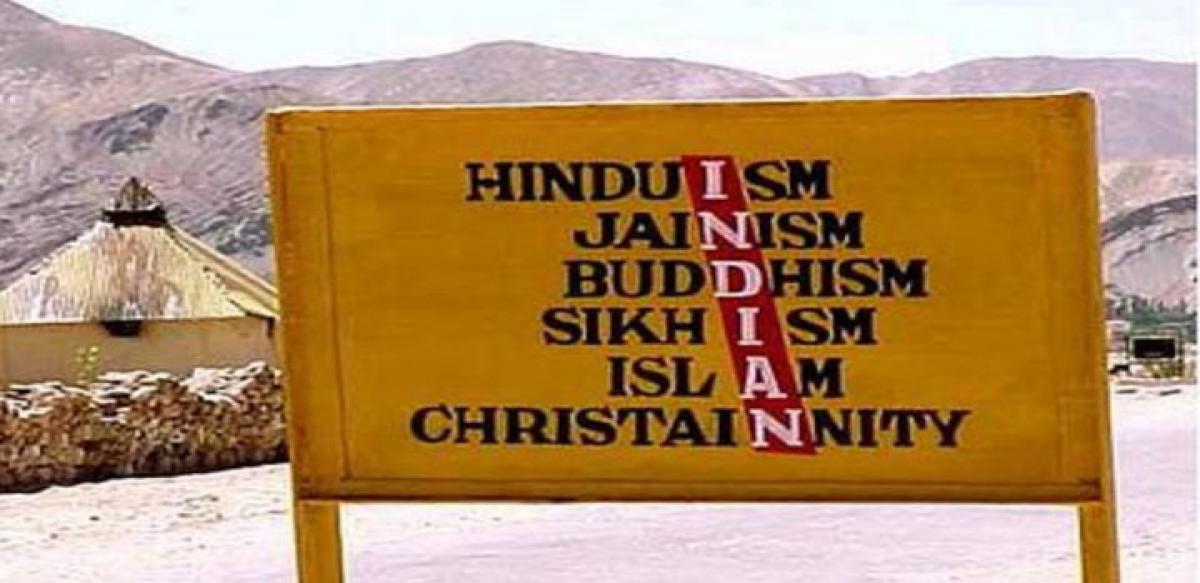Live
- Govt plans to establish offshore Johns Hopkins University Campus in India
- Goa Aces clinch Indian Racing League title
- Study finds how hormone therapy can reshape the skeleton
- High-street fashion players looking at India for manufacturing: Report
- Shreyas Iyer to lead Mumbai as Prithvi Shaw returns for Syed Mushtaq Ali Trophy
- 'Failed to resolve crisis': NPP withdraws support from BJP govt in Manipur
- Chennai: Actress Kasturi Remanded in Custody Until 29th of This Month
- Aaqib Javed likely to become Pakistan's new white-ball head coach
- BJP panel to draft poll charge sheet against AAP govt in Delhi
- Allu Arjun Thanks Fans in Patna, Teases 'Pushpa 2' Release
Just In

Notwithstanding the fact that the words \'Socialist\' and \'Secular\' were added in the Preamble of the Constitution in 1976 by the 42nd Amendment, the concept of Secularism was very much embedded in our constitutional philosophy.

Notwithstanding the fact that the words 'Socialist' and 'Secular' were added in the Preamble of the Constitution in 1976 by the 42nd Amendment, the concept of Secularism was very much embedded in our constitutional philosophy. The term 'Secular' has advisedly not been defined presumably because it is a very elastic term not capable of a precise definition and perhaps best left undefined.
By this amendment what was implicit was made explicit. The Preamble itself spoke of liberty of thought, expression, belief, faith and worship. While granting this liberty the Preamble promised equality of status and opportunity.
It also spoke of promoting fraternity, thereby assuring the dignity of the individual and the unity and integrity of the nation. While granting to its citizens liberty of belief, faith and worship, the Constitution abhorred discrimination on grounds of religion, etc., but permitted special treatment for Scheduled Castes and Tribes, vide Articles 15 and 16.
Not only in fundamentals rights (as has been discussed above) protected by the Right to Constitutional Remedies, but the Principle of Secularism has been incorporated (although implicitly) in the Directive Principles of State Policy (DPSP) and the Fundamental Duties as well.
In the DPSP, the articles of 38, 39, 39A, 41 & 46 not only attempts to promote equal opportunity for growth and sustenance for all, but these principles, coupled with the most basic objective of the state, the doctrine of ‘Parens Patriae’, promotes secularism in all of its form.
Although not justiciable but the onus of maintaining the cordial atmosphere among all the religions & caste, creed and sex is also the responsibility of the citizens as per the Fundamental Duties, especially according to articles 51A(b), 51A(e) & 51A(f).
Among these, though Fundamental Duties were added only in 1976 but the rest, ie. Both Fundamental Rights and Directive Principles of State Policy were incorporated at the time of enactment of the Constitution itself, in 1949.
This fact is evident enough about the true intention of the founding fathers in promoting the principles of secularism. Henceforth, even though the word ‘Secular’ was explicitly added in the Preamble of the Constitution as late as 1976 (the 42nd Constitutional Amendment) but the Constitution has been an embodiment of the secular principles from its very inception.
However, in conclusion, one can only quote from the Dr. B. R. Ambedkar, that “Constitution is not a mere lawyer’s document, it is a vehicle of Life, and its spirit is always the spirit of Age.” Henceforth, whether the word secular is mentioned in the Preamble or not, it is the spirit of Modern India, which has often found its expression in the form of judicial interpretation, especially as the ‘Basic Structure’, will act as the guiding force for the body politic to adopt this novel ideal.

© 2024 Hyderabad Media House Limited/The Hans India. All rights reserved. Powered by hocalwire.com







